 In ancient China, where the earliest known chrysanthemums (called Chu) were cultivated as a flowering herb as far back in the mists of time as 1,500 years before Christ, the plant was believed to hold the power of life. The flower petals and sprouts were eaten as salad greens, the leaves brewed as a tea, and an infusion of the roots championed as a cure for headache. Brought to the western world many centuries later in the mid-1700s by Swedish botanist Karl Linnaeus, he it was who christened the plant with the name chrysanthemum, from the Greek words for “golden flower.” Golden and one of the most glorious forms of life in the autumn garden it assuredly remains in the present day.
In ancient China, where the earliest known chrysanthemums (called Chu) were cultivated as a flowering herb as far back in the mists of time as 1,500 years before Christ, the plant was believed to hold the power of life. The flower petals and sprouts were eaten as salad greens, the leaves brewed as a tea, and an infusion of the roots championed as a cure for headache. Brought to the western world many centuries later in the mid-1700s by Swedish botanist Karl Linnaeus, he it was who christened the plant with the name chrysanthemum, from the Greek words for “golden flower.” Golden and one of the most glorious forms of life in the autumn garden it assuredly remains in the present day.If springtime means the portal to the garden is swinging open upon the magical, tantalizing cornucopia of all the wonders to come, in autumn the doorway is slowly narrowing toward its close. The sophisticated, finely tailored, stately-paced chrysanthemum places a well-shod foot into the garden doorway and holds it firmly ajar for another month or two of color, scent and bloom, when nearly all the other plants are discarding their bib and tucker, and turning with drooping eyelids towards the long winter sleep.
Because chrysanthemums keep us in the company of flowers during September and October, they number high on my fairly brief list of favorite features of the autumn season. Their sedate, regal progress through the cycle of growth and bloom mirrors the slowing, more peaceful pace that is a second gift of the season. The garden ceases the mad dash that characterized it in spring, as well as the busy, dawn-to-dusk endeavors of summertime, and grows more quiet, contemplative and serene. Resting on the laurels of its high season accomplishments, it envelops the plants, the birds, the bees, and the gardener in welcome respite from continual toil. In autumn the garden folds us to its ample bosom, encourages repose and reflection among its languid and leafy bowers, whispers and hums lullaby-style in place of its bravura choruses of spring.
The colors autumn dons are another of its treasures. Jubilant pink, exclamation-point white, buttercup yellow and bold-boy blues give way to warm, firelight, harvest tints, the tawny garments of the garden wardrobe. Autumn is the color of honey, of burnished copper along the fringes of the peony and red oak leaves, and lavender-mint shading in the bird's nest baskets of the closing Queen Anne's lace flowerheads. The colors of spring are youthful exuberance which cannot wait to flaunt itself before our gaze, the colors of autumn are mature, mellow, gentle on the eyes, and reveal themselves in a long, decorous meander across many dappled weeks.
Spring bestows heady rejuvenation in the garden, autumn gives us time. It takes our hand and strolls us unhurried along its dense banks of stippled dune and fountain grasses, rust-red cattails and cabernet sumac, and day by day, layer by measured layer, it delicately paints the deciduous forests through months of sumptuous, molten color. The tree color tour in the northern Midwest is never an event of a single day, weekend or week. It isn't one of nature's all-in-an-instant, cataclysmic occurrences, such as a volcano, earthquake, tornado. The changing of the leaves takes place as a gradually developing acquaintance, beginning with just a brushing of the tree's fingertips at the outermost edges of the crown, then moving downward and inward at a snail's pace across the limbs of the tree. Each day the friendship with color advances by wee increments and deepens, until the ultimate culmination is reached in the tree's full-flung love affair with autumn's brushed reds, golds and chestnut browns.
Weather is the last best facet of autumn for the gardener. Once St. Bartholomew's “cold dew” comes falling nightly round about August 24, even in drought years the garden reclaims a green cast to its foliage and is refreshed. Cool nights averaging in the forties typify September and October, perfect for sleep and windows left open to the freshening air. The days awaken misty, with thin shawls of fog on meadows and hillsides, then warm rapidly into hot, sun-filled afternoons exactly right for dawdling down the shady rows of an apple orchard, plucking the ruby-ripe fruit.
Autumn brings regular, dependable, sometimes quite spectacular rain showers and lightning storms, nature's unequalled fireworks that burn across the long, open horizon of the big lake. Few pleasures can match that of a Great Lakes mighty thunderstorm rolling in, its waterfalls drumming against the rooftop and windowpanes whilst the gardener sits snug and warm at the hearthside, knowing the trees, shrubs, and flora are drinking their fill, soaking up the fresh water that is the garden elixir of life. Autumn weather is the gardener's able assistant, recharging life in the garden and refueling its stores for the months ahead. Thus in its unassuming, slow, lustrous way, autumn returns like a comfortable old friend, bearing its special gifts and making itself very welcome.
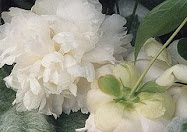


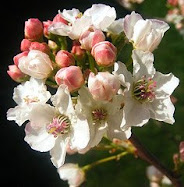
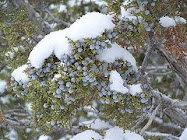

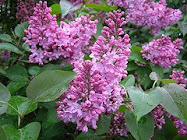
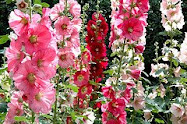
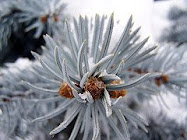
No comments:
Post a Comment